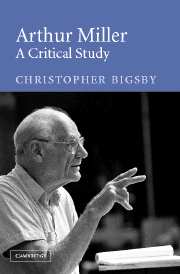Book contents
- Frontmatter
- Contents
- Acknowledgements
- Note on the text
- Introduction
- 1 The Michigan plays
- 2 The Golden Years, The Half-Bridge, Boro Hall Nocturne
- 3 The radio plays
- 4 The Man Who Had All the Luck
- 5 Focus
- 6 All My Sons
- 7 Death of a Salesman
- 8 Arthur Miller: time-traveller
- 9 An Enemy of the People
- 10 The Crucible
- 11 A Memory of Two Mondays
- 12 A View from the Bridge
- 13 Tragedy
- 14 The Misfits
- 15 After the Fall
- 16 Incident at Vichy
- 17 The Price
- 18 The Creation of the World and Other Business
- 19 The Archbishop's Ceiling
- 20 Playing for Time
- 21 The shearing point
- 22 The American Clock
- 23 The one-act plays: Two-Way Mirror, and Danger: Memory!
- 24 The Ride Down Mount Morgan
- 25 The Last Yankee
- 26 Broken Glass
- 27 Mr Peters' Connections
- 28 Resurrection Blues
- 29 Finishing the Picture
- 30 Fiction
- 31 Arthur Miller as a Jewish writer
- Notes
- Index
26 - Broken Glass
Published online by Cambridge University Press: 16 November 2009
- Frontmatter
- Contents
- Acknowledgements
- Note on the text
- Introduction
- 1 The Michigan plays
- 2 The Golden Years, The Half-Bridge, Boro Hall Nocturne
- 3 The radio plays
- 4 The Man Who Had All the Luck
- 5 Focus
- 6 All My Sons
- 7 Death of a Salesman
- 8 Arthur Miller: time-traveller
- 9 An Enemy of the People
- 10 The Crucible
- 11 A Memory of Two Mondays
- 12 A View from the Bridge
- 13 Tragedy
- 14 The Misfits
- 15 After the Fall
- 16 Incident at Vichy
- 17 The Price
- 18 The Creation of the World and Other Business
- 19 The Archbishop's Ceiling
- 20 Playing for Time
- 21 The shearing point
- 22 The American Clock
- 23 The one-act plays: Two-Way Mirror, and Danger: Memory!
- 24 The Ride Down Mount Morgan
- 25 The Last Yankee
- 26 Broken Glass
- 27 Mr Peters' Connections
- 28 Resurrection Blues
- 29 Finishing the Picture
- 30 Fiction
- 31 Arthur Miller as a Jewish writer
- Notes
- Index
Summary
Broken Glass concerns a woman, Sylvia Gellburg, who has suddenly lost the use of her legs. There is apparently no physical reason for this. Nonetheless, the effects are undeniable. If the cause is psychological, however, what can its source be? Admittedly, she is obsessed by the news from Germany. In particular, she is transfixed by a newspaper photograph of elderly Jews forced to scrub the sidewalks with toothbrushes. But these events are taking place thousands of miles away. She herself is, ostensibly, safe. Why, then, can she not get the images out of her head? And why is she curiously happy unless because, as Miller has said, ‘it is as though something has settled now. She is a cripple. There is nothing she can do.’
Sylvia is located at the point where the private and the psychological interleave with the public and the social. Her own life had been in a state of suspended animation long before the traumatic events of 1938. She is married to a man ill-at-ease with himself and others. He is proud to be the only Jew in a WASP company, seemingly unaware of the condescension that is the price to be paid for being transformed from a man into a symbol. His employer refers to him and his fellow Jews as ‘you people’. A prize-winning yachtsman, he ‘had me aboard twice … The only Jew ever set foot on that deck’ (11).
- Type
- Chapter
- Information
- Arthur MillerA Critical Study, pp. 391 - 404Publisher: Cambridge University PressPrint publication year: 2004



